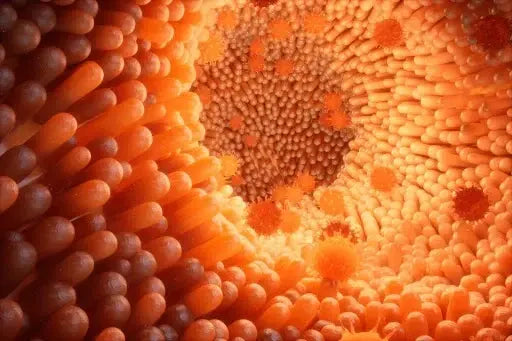Why Nutrient Absorption is Your Skin’s Secret Ally
Why Nutrient Absorption is Your Skin’s Secret Ally
How Absorption in the Gut Gets Disrupted
How Absorption in the Gut Gets Disrupted
The Secret to Better Skin Health? Better Gut Health
- Reach for probiotic foods such as yogurt, kefir, sauerkraut, and kombucha.
- Include prebiotic foods like bananas, garlic, and legumes like chickpeas, lentils, and black beans.
- The daily RDA for women is 21-25 grams; for men, it’s 21-30 grams [4].
- Best sources of fiber include spinach, sweet potatoes, broccoli, berries, apples, pears, cabbage, and Brussels sprouts.
- Seafood such as salmon, tuna, and sardines contain a high amount of EPA/DHA, one type of healthy Omega-3 fat.
- Chia and flax seeds, nuts, and certain fats from grass-fed animals include alpha-linolenic acid (ALA), another form of Omega-3s.
- Aim to drink half your body weight in pounds in ounces of water. For example, if you weigh 150 pounds, try to drink 75 ounces of water per day.
- Regular physical activity promotes the growth of good bacteria—even walking counts [6]
- High-quality sleep helps maintain the body’s circadian rhythm, which has positive effects on gut bacteria [7]
- Managing chronic stress can keep gut flora diversified and prevent harmful bacteria strains from taking over [8]
The Secret to Better Skin Health? Better Gut Health
- Reach for probiotic foods such as yogurt, kefir, sauerkraut, and kombucha.
- Include prebiotic foods like bananas, garlic, and legumes like chickpeas, lentils, and black beans.
- The daily RDA for women is 21-25 grams; for men, it’s 21-30 grams [4].
- Best sources of fiber include spinach, sweet potatoes, broccoli, berries, apples, pears, cabbage, and Brussels sprouts.
- Seafood such as salmon, tuna, and sardines contain a high amount of EPA/DHA, one type of healthy Omega-3 fat.
- Chia and flax seeds, nuts, and certain fats from grass-fed animals include alpha-linolenic acid (ALA), another form of Omega-3s.
- Aim to drink half your body weight in pounds in ounces of water. For example, if you weigh 150 pounds, try to drink 75 ounces of water per day.
- Regular physical activity promotes the growth of good bacteria—even walking counts [6]
- High-quality sleep helps maintain the body’s circadian rhythm, which has positive effects on gut bacteria [7]
- Managing chronic stress can keep gut flora diversified and prevent harmful bacteria strains from taking over [8]
How OneSkin’s Topical Supplements Can Help
How OneSkin’s Topical Supplements Can Help
- Nutrient absorption is crucial for overall skin health
- Vitamins and minerals such as A, C, E, D, zinc, and selenium play a role in skin elasticity, repair, and collagen production
- Improving digestive system function aids in extracting and absorbing nutrients from food
- Probiotics, adequate fiber, healthy fats, hydration, and lifestyle factors like exercise, sleep, and stress management help enhance gut health
- OneSkin’s OS-01 peptide takes an innovative outside-in approach to improving the health of your skin
- Nutrient absorption is crucial for overall skin health
- Vitamins and minerals such as A, C, E, D, zinc, and selenium play a role in skin elasticity, repair, and collagen production
- Improving digestive system function aids in extracting and absorbing nutrients from food
- Probiotics, adequate fiber, healthy fats, hydration, and lifestyle factors like exercise, sleep, and stress management help enhance gut health
- OneSkin’s OS-01 peptide takes an innovative outside-in approach to improving the health of your skin
- https://www.ncbi.nlm.nih.gov/pmc/articles/PMC3583891/
- https://www.crohnscolitisfoundation.org/diet-and-nutrition/malnutrition-and-ibd
- https://www.ncbi.nlm.nih.gov/pmc/articles/PMC4831151/
- https://www.health.harvard.edu/blog/should-i-be-eating-more-fiber-2019022115927
- https://www.ncbi.nlm.nih.gov/pmc/articles/PMC2174995/
- https://journals.plos.org/plosone/article?id=10.1371/journal.pone.0171352
- https://www.ncbi.nlm.nih.gov/pmc/articles/PMC5123208/
- https://pubmed.ncbi.nlm.nih.gov/26479188/
- https://www.ncbi.nlm.nih.gov/pmc/articles/PMC3583891/
- https://www.crohnscolitisfoundation.org/diet-and-nutrition/malnutrition-and-ibd
- https://www.ncbi.nlm.nih.gov/pmc/articles/PMC4831151/
- https://www.health.harvard.edu/blog/should-i-be-eating-more-fiber-2019022115927
- https://www.ncbi.nlm.nih.gov/pmc/articles/PMC2174995/
- https://journals.plos.org/plosone/article?id=10.1371/journal.pone.0171352
- https://www.ncbi.nlm.nih.gov/pmc/articles/PMC5123208/
- https://pubmed.ncbi.nlm.nih.gov/26479188/


